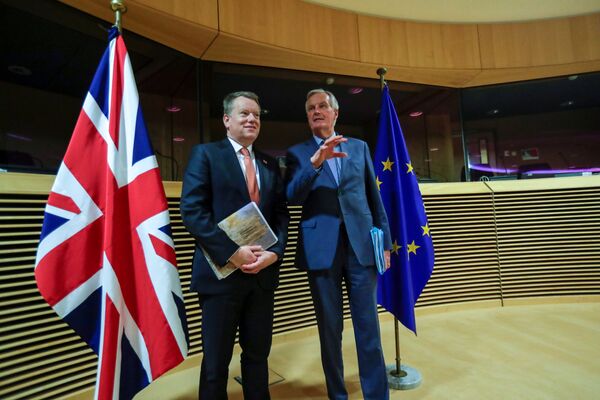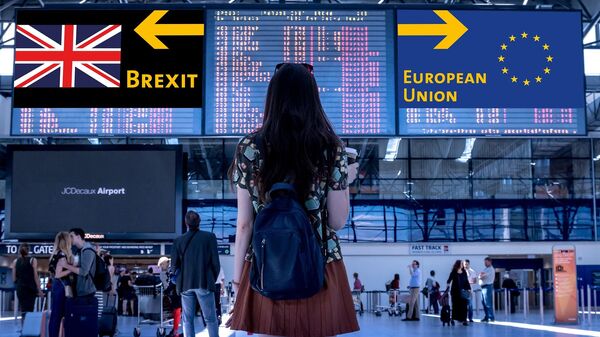Foreign Secretary Dominic Raab has suggested a divisive "economic debate" is now under way in the British government about the extent of state intervention, arguing it is crucial Britain retain full control of the amount of state subsidies and competition it needs.
There were "really only two bones of contention left", he said, adding though that no compromise was possible on a "straightforward point of principle", meaning that an internal row over the extent of subsidies needed for Boris Johnson's economic initiatives is further contributing to the UK's firm stance on not giving in to the EU in Brexit talks.

In particular, as Dominic Cummings, Mr Johnson's right-hand man, is keen to encourage the growth and expansion of high-tech companies, Raab said that the government's plans to boost the North and the Midlands while recovering from the pandemic could require "more significant intervention in some areas" than the Tories had previously eyed.
"There is that debate, an economic debate. As Conservatives we've got a proud record of being pro-competition, pro-consumer. But we've also got our levelling-up agenda and in the context of COVID we see that you have to have more significant interventions in some areas. So it allows us the latitude to tailor British policy to . . . the national interest rather than the rules dictated or the control exercised by the EU", Raab explained why the UK had grown especially insistent on having it its own way.
Raab believes that the EU should in not be worried about the government lobbying the projects it is primarily interested in. In comments to Sky News Sophy Ridge on Sunday he said that the only question is why a double standard is being applied to his country, which formally exited the EU on 31 January – "that's a point of principle", as Raab put it.
He insisted that a deal was "there for the taking" and that Britain wanted an agreement to avoid the "damaging impacts" of tariffs and other barriers.
'Point of Principle'
Raab described this week's eighth round of talks as a "wake up call" for the EU, insisting that all the UK is asking for is, as reiterated multiple times by Downing Street, is to be approached "like any other country in free trade negotiations".
"No other country would accept being bound or controlled by the EU's rules . . . that's a straightforward point of principle", he stressed.
Referring to the downsides of a no-deal agreement for both parties he told The Andrew Marr Show on BBC One:
"We'd much rather have a deal and that's why we're continuing these negotiations with the EU. All of those damaging impacts will be the same on the other side, if not greater".
However, an EU diplomatic source cited by The Times hit back, dismissing the rhetoric as "predictable":
" . . . if the talks fail then they fail. Both sides will have to live with that. The consequences will be much worse for the UK than the EU, which has its single market", the source warned.
In an interview with the Mail on Sunday over the weekend, David Frost insisted that Britain would "not blink this time", in a jab aimed at former Prime Minister Theresa May's team, arguing the UK would rather leave with no deal than end up as a EU "client state".
"We came in after a government and negotiating team that had blinked and had its bluff called at critical moments and the EU had learned not to take our word seriously", Frost started off, adding that what Britain has of late been doing is "to get them to realise that we mean what we say and they should take our position seriously".
Calls for 'More Realism' From EU
The bullish Brexit rhetoric is part of an attempt by Johnson's government to "re-grip the agenda" after a tumultuous summer, marked by COVID and post-lockdown chaos as well as A-level exam crisis. The UK prime minister is notably going to give the European Union 38 days to strike a free-trade deal with Britain, according to a transcript released by his office.
This week will see the final phase of the negotiations, with Lord Frost's team calling for "more realism" from the EU to break the deadlock and meet the transition period deadline for a comprehensive bilateral deal.
The two biggest sticking points remain fishing rights and state aid rules. Michel Barnier said that while the UK can retain control over the waters washing its coasts, "the fish which are inside those waters" are "another story", whereas the UK insists local trawlers should be granted full priority.
Separately, Brussels is seeking a "level playing field" on state aid rules that would virtually tie Britain to EU regulations on workers’ rights and state aid to business after the transition period expires – something the UK has declined to agree to.




